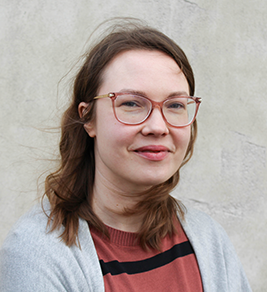Social scientist specialised in sustainability transitions, remote locations and energy politics. My PhD focused on Russian regional development in the Arctic and how it links with renewable energy prospects, and now I’m broadening my scope to include Finnish rural regions. My research ambition is to explore how to make sustainability transitions more just by putting more focus on habits.
Senior Research Fellow
Hilma Salonen
Spatial Story
A car trip to the summer house (mökki) is an institution in Finland, and for me, it has usually taken up the whole day. Leaving from Uusimaa region, reaching our tiny family island in the embrace of Lake Saimaa means traversing almost 500 kilometers and spending around six hours in a car. While the long-distance excludes quick weekend trips to the summer house, it has its benefits as well. The summer house mood takes that time to build up. During the trip, we stop for coffee at our favourite places, know a good spot where to let the dog for a swim, have time to listen to the Finnish adult rock playlist in all its entirety, and notice a change in scenery from fields and suburbia to islet-dotted lakes and steep hills of dark green. As a kid, my dad pulled over once and showed us that we were so close to the border that the forest in the distance was already Russia. Looking at that seemingly ordinary forest that belonged to some unknown reality felt like standing at the edge of a vast ocean. When I get out of the car after the long trip, I don’t feel like the urban Hilma anymore. It’s time to put on the same summer house clothes as every visit and start carrying some firewood to the sauna.
The concept of local identity has always been difficult for me to experience personally, but I like the idea of growing into scenery via repeated visits and key memories. I’m clearly not from Northern Karelia – I have never even seen our summer house in the winter – but my grandma is from there and I see her family name still in every other mailbox, reminding me that anyone I meet may well be one of my distant relatives. Once, when we were driving to the summer house and I was half asleep in the back seat, I heard parts of a radio essay by someone whose name, unfortunately, escaped my blurry brain. Only one phrase stuck: The landscape where our consciousness emerges grows into us. I think that somewhere in this thought is the key to a sense of belonging: sediment of repeated memories etched into a landscape.
Publications
Salonen, H., Beyond the numbers: How green transitions can prioritise rural communities to ensure a more just transition, Energy Research & Social Science, Volume 127, 2025, 104287, https://doi.org/10.1016/j.erss.2025.104287
Salonen, Hilma. (2021). All habits die hard: Exploring the path dependence and lock-ins of outdated energy systems in the Russian Arctic. Energy Research & Social Science 78.
Gritsenko, Daria & Salonen, Hilma. (2021). A local perspective on renewable energy development in the Russian Arctic. Elementa: Science of the Anthropocene 8.
Salonen, Hilma. (2019). Modernization of Russian district heating systems with the help of biomass energy – A Gordian knot? Environmental Innovation and Societal Transitions 36. Salonen, Hilma. (2018). Public justification analysis of Russian renewable energy strategies. Polar Geography 41.
